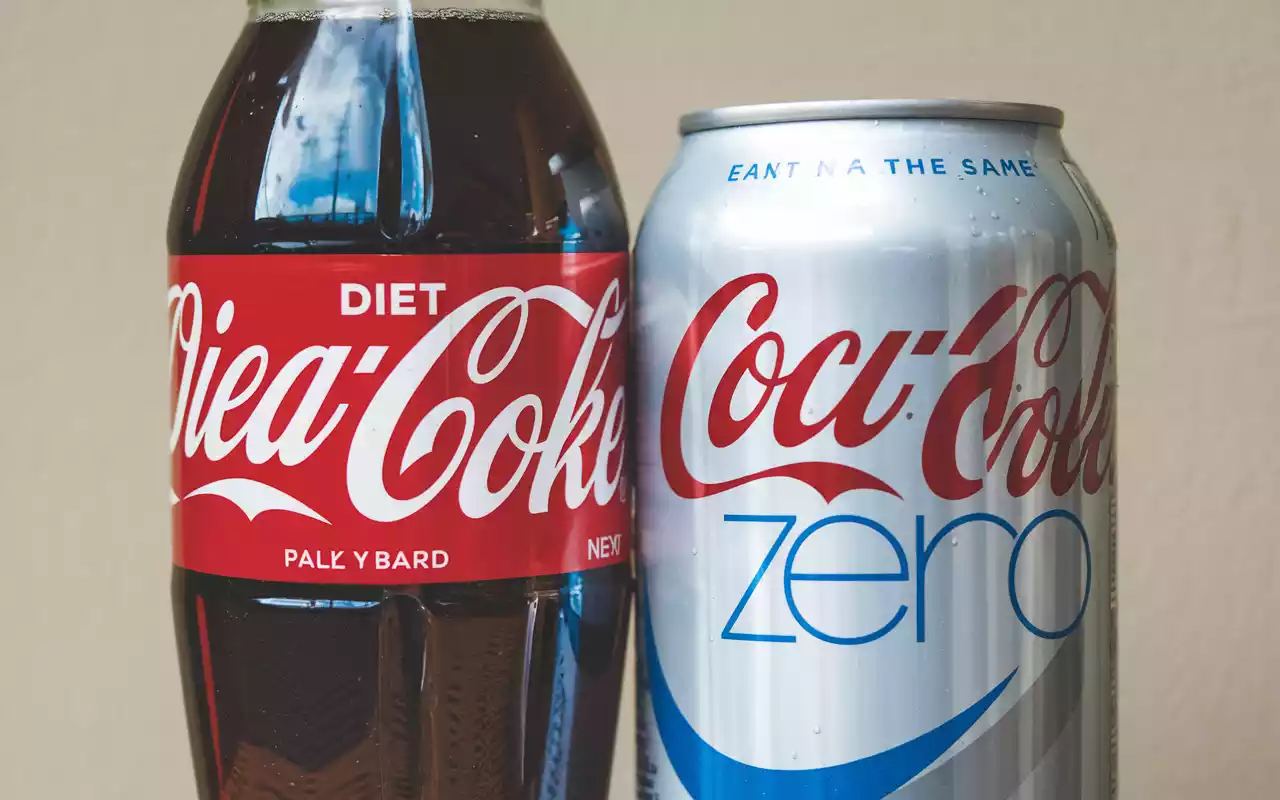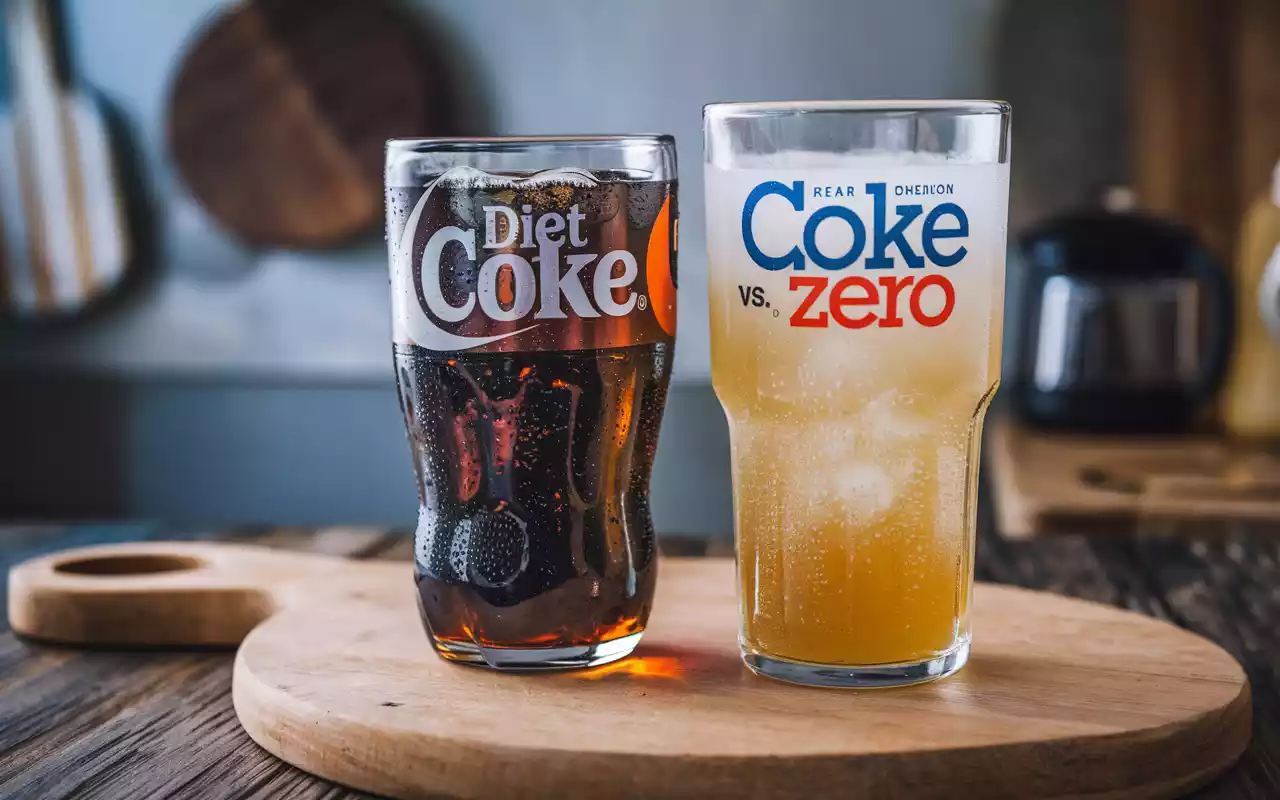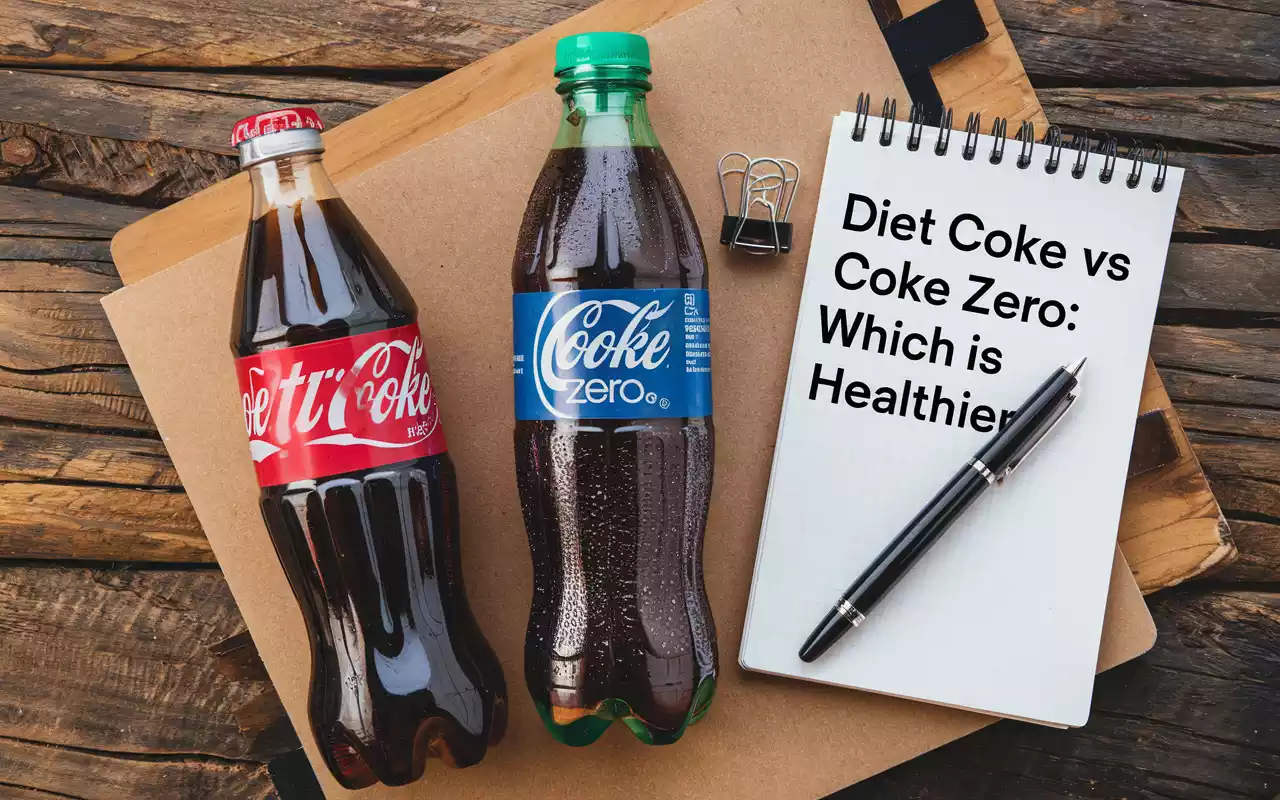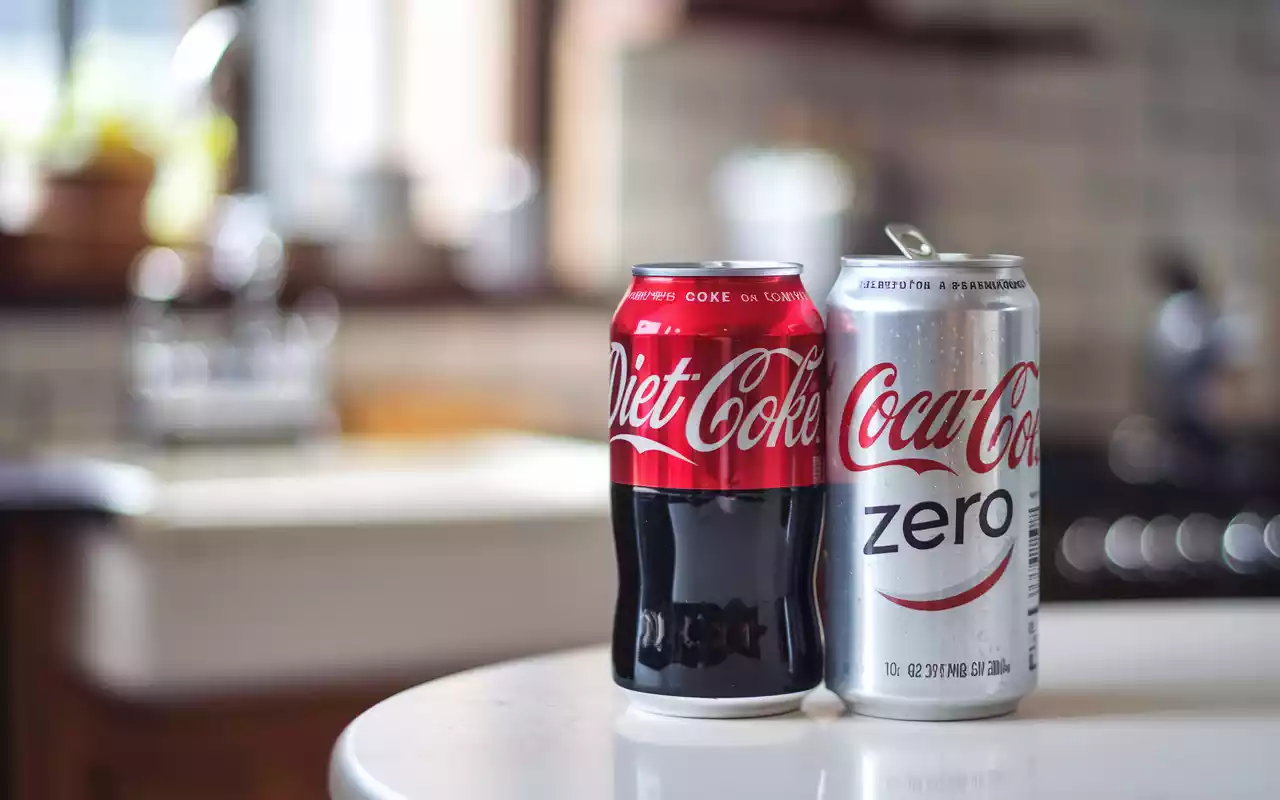Overview: The Adoption of Sugar-Free Drinks
difference between diet coke and coke zero: In today’s health-conscious society, many are satisfying their cravings for sweet, bubbly beverages without adding extra calories by using sugar-free alternatives. Diet Coke and Coke Zero, two beverages that guarantee a comparable experience—the iconic Coca-Cola taste without the added sugar—are among the most popular options. But what distinguishes these two drinks specifically? Though they may share certain characteristics, Diet Coke and Coke Zero are two distinct products. By knowing these distinctions, you can make the best decision for your preferences and health requirements.
A Synopsis of Diet Coke and Coke Zero’s History

In 1982, the Coca-Cola Company introduced Diet Coke, the first version of the drink without added sugar. It soon gained popularity among customers who wanted to experience the traditional Coca-Cola flavor without feeling guilty about the added sugar and calories. During the 1980s fitness craze, there was a growing need for healthier beverage options. Diet Coke was revolutionary for its time.
Conversely, Coke Zero was introduced in 2005—more than 20 years after Diet Coke. It was created with a younger audience in mind, especially men who might think of Diet Coke as a “diet” beverage that is mostly sold to women. The idea was to produce a drink that tasted a lot like ordinary Coca-Cola but without the added sugar and calories, thus offering an alternative for those who didn’t enjoy the distinct taste of Diet Coke compared to the original.
Essential Components: Diet coke and coke zero
At first glance, the ingredient lists for Coke Zero and Diet Coke might appear almost identical. Carbonated water, caramel color, phosphoric acid, potassium benzoate (to preserve flavor), citric acid, natural flavors, and caffeine are all present in both drinks. On closer inspection, though, significant variations can be seen in their flavorings and sweeteners.
Since the 1980s, aspartame, a low-calorie artificial sweetener, has been used to sweeten a range of diet foods and beverages, including Diet Coke. Due of aspartame’s extreme sweetness—roughly 200 times sweeter than sugar—it can mimic the taste of sugar without gaining any extra calories.
Conversely, Coke Zero is sweetened using a blend of aspartame and acesulfame potassium, also known as Ace-K. Another low-calorie sweetener that intensifies sweetness and has a marginally distinct flavor character is acesulfame potassium. Because of this concoction of sweeteners, Coke Zero is frequently compared to the original Coca-Cola in terms of flavor.
Diet coke and coke zero: A Comparative Analysis

While everyone has their own soda preferences, Diet Coke and Coke Zero offer unique flavors that fans of each brand are quick to highlight.
The flavor of Diet Coke is crispier and lighter than that of regular Coca-Cola. Taste-wise, it’s a little different, with a faint aftertaste that some find “chemical” or “metallic,” perhaps from the aspartame. Because of this noticeable difference in flavor, many fans of normal Coca-Cola do not think Diet Coke is a good enough replacement.
Conversely, Coke Zero was created to taste as close to regular Coca-Cola as feasible. It tastes fuller, richer, and more like the original with a more velvety finish. This closer mimicking is made possible by the combination of Ace-K and aspartame, which makes it a popular option for people who enjoy Coca-Cola’s flavor but wish to stay away from its calories and sugar.
Sweeteners Used: Acesulfame Potassium vs. Aspartame
Over the years, aspartame—the main sweetener in Diet Coke—has been the focus of extensive discussion and investigation. Because it’s around 200 times sweeter than sugar, you just need a tiny bit to get the right sweetness. But some people find the subtle aftertaste of aspartame unpleasant. Aspartame has been given the go-ahead to be used by regulatory agencies across the globe, such as the FDA, WHO, and EFSA, despite continuous discussions regarding its safety.
Because it has a little bitter flavor and is around 200 times sweeter than sugar, acesulfame potassium—which is used in Coke Zero with aspartame—is frequently combined with other sweeteners. Coke Zero’s aspartame and Ace-K combination is intended to taste more like sugar without the added calories, and it masks aspartame’s aftertaste better than Diet Coke does.
Diet coke and coke zero: Calories, Carbs, and Other Details

Diet Coke and Coke Zero are nearly identical in terms of nutrients. There are zero calories, zero fat grams, zero carb grams, and zero protein grams in both drinks. They are both almost completely devoid of salt, with the exception of a tiny bit added for flavor.
The amount of caffeine in each is the primary nutritional distinction between the two. In 12-ounce cans, Diet Coke contains about 46 mg more caffeine than Coke Zero, which contains 34 mg. Even while there isn’t much of a difference, people who are sensitive to caffeine or are attempting to cut back on their intake might want to take that into account.
Consequences for Health: Which Is the Better Option?
There has been a lot of controversy about the health effects of drinking Coke Zero and Diet Coke. For people attempting to control their blood sugar levels or lose weight, these beverages provide an alternative means of indulging in a sweet, carbonated beverage without the added calories and sugar. But the long-term repercussions of eating artificial sweeteners like Ace-K and aspartame are a source of concern.
Artificial sweeteners have been connected in some research to a number of health problems, such as a higher risk of metabolic syndrome, weight gain, and even cardiovascular disease. Some health groups, however, disagree, arguing that artificial sweeteners are harmless as long as they are used in moderation.
Think about how often you drink these drinks and whether you might want to cut back on your intake if artificial sweeteners worry you. For those who prefer a taste more like regular Coca-Cola, Coke Zero might be a better option due to its flavor profile. On the other hand, Diet Coke can be more to your taste if you like a somewhat stronger caffeine boost and a lighter flavor.
Coca-Cola’s Product Positioning and Brand Perception: A Comprehensive Analysis
Coca-Cola targets separate consumer niches with Diet Coke and Coke Zero, positioning them differently in the market. In the beginning, Diet Coke was marketed as a means for women in particular who were health-conscious to enjoy a refreshing cola without the calories. Models and celebrities have frequently appeared in branding efforts that highlight sophistication and elegance.
In contrast, Coke Zero has been extensively advertised to men and younger consumers, emphasizing the drink’s resemblance to ordinary Coca-Cola. With an emphasis on sports and gaming, the branding is frequently brash and exuberant. The word “zero” itself is intended to communicate the idea of zero calories without sacrificing flavor, appealing to a wider audience that may be put off by the term “diet.”
Customer Preferences: How Do They Actually Feel?

There is a wide range of consumer preferences between Diet Coke and Coke Zero. Some people strongly favor one over the other, usually due to personal choice. Diet Coke enthusiasts are loyal to the crispier, lighter flavor, while Coke Zero enthusiasts desire a more authentic Coca-Cola taste.
Taste tests and surveys frequently reveal differences in consumers’ tastes, with Coke Zero typically coming in first among those who want a more authentic Coca-Cola flavor. Nonetheless, Diet Coke is still well-liked, especially among regular drinkers who have grown to enjoy it.
Diet coke and coke zero: conclusion
The decision between Coke Zero and Diet Coke ultimately boils down to personal taste. In case you’re searching for a sugar-free beverage that tastes almost exactly like ordinary Coca-Cola, Coke Zero is perhaps a better option. Because of its aspartame and Ace-K blend, it has less of the Diet Coke aftertaste problems while offering a richer, more genuine flavor.
Conversely, Diet Coke might be your best option if you’d rather have a lighter, more refreshing beverage with a little bit more caffeine. It gives the same calorie-free pleasure as Coke Zero and has a unique flavor that a lot of people have come to adore.
Whichever option you select, keep in mind that moderation is essential. While sugar-free sodas can be a useful tool for controlling caloric intake, they shouldn’t be used as a main source of hydration and should instead be consumed as part of a balanced diet.
Post Disclaimer
The information contained in this post is for general information purposes only. The information is provided by Feast Forge Chef and while we endeavour to keep the information up to date and correct, we make no representations or warranties of any kind, express or implied, about the completeness, accuracy, reliability, suitability or availability with respect to the website or the information, products, services, or related graphics contained on the post for any purpose.


12 thoughts on “diet coke and coke zero: The Surprising Difference You Need To Know!”